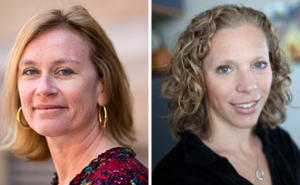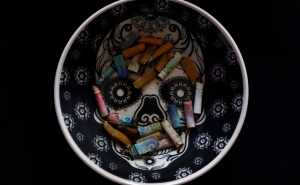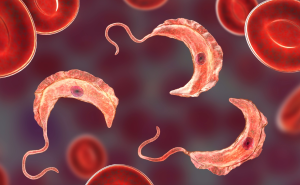Dory Storms, ScD ’82, MPH, Champion of Community-Based Child Survival Programs, Dies
Dory Storms, ScD, ’82 MPH, an influential, well-respected, and long-serving faculty member in the Bloomberg School’s Department of International Health, died on October 11 at the age of 89. Dory, who was also an Department alumna, served as a faculty associate from 1977 until 2019. She was widely known and admired throughout the NGO global health community for her championing of U.S.-based NGOs in the provision of community-based child survival programs.

From left to right: Joseph Valadez, Dory Storms, Henry Perry, and Lisa Hilmi
From 1986 to 1998, Dory directed the Johns Hopkins University PVO Child Survival Support Program for USAID’s Child Survival and Health Grants Program (CSHGP). This small but innovative and effective program provided grants to Private Voluntary Organizations (PVOs), which are U.S.-based NGOs that receive at least 20% of their income from voluntary private donations. Dory’s office provided technical support to the CSHGP for setting technical standards for the program, coordinating independent technical reviews of grant applications, and providing technical support to grant awardees.
Dory and her team helped to create an enabling environment for U.S.-based NGOs to developed world-class community-based child survival programs. The program was greatly admired throughout USAID and beyond for the high-quality of the child survival projects that were implemented, many of which had lasting impacts in multiple ways once their funding ended. It is widely recognized among the NGOs themselves that participated in the CSHGP that it was transformational for their own work because of the high level of technical quality and rigor required by participation in the program. Among the innovations of the program were the required baseline household survey to measure population coverage of key child survival interventions, the preparation of a rigorous detailed implementation plan that underwent independent technical review prior to formal program implementation, the conduct of a mid-term evaluation by an independent evaluator, and a final endline household survey measuring population coverage of key child survival interventions.
Dory had a unique gift for nurturing young public health professional who had an interest in working with communities. Her infectious spirit of collaboration and her passion for community health programming motivated the PVO community to come together to form an organization of PVOs called the CORE Group, an acronym for COllaboration and REsources for Child Survival. Today, this organization is a thriving association of more than 60 NGO members that serves as a resource for community programming that is used widely throughout the world as well as a forum for sharing advances in community health programming.
In 1998 the CORE Group gave its first Child Survival Recognition Award to Dory in recognition of “her vision, concern, intelligence, commitment, creativity, laughter and love for people in the developing world” and for “her leadership and courage in guiding PVOs working in child survival.” The award noted that her efforts “resulted in more effective program implementation and increased impact on improving the health of the poorest of the poor mothers, children and infants in underserved communities throughout the world.”
In 2001, the CORE Group honored Dory’s legacy by creating the Dory Storms Award, given annually to individuals “for exceptional efforts resulting in more effective child survival program implementation and increased impact in improving the health of the poorest of the poor including mothers, children and infants in underserved communities throughout the world." Department faculty members who have received this award include Abdullah Baqui, Henry Perry, Peter Winch, and the late Carl Taylor.
Dory obtained her undergraduate degree from the Washington University in 1960 and her master’s in public health degree from Yale University in 1968. In the 1970s she worked as the director of research at the Johns Hopkins School of Health Services, which trained the Johns Hopkins version of physician assistants. In the early 1980s she worked with Carl Taylor, then chair of the Department of International Health, and obtained her doctorate degree from the Department in 1982.
Dory was an enormously warm and compassionate person who may be best remembered for having nurtured and empowered PVOs to become a respected and powerful force addressing the needs of the world’s poorest people using evidence-based methods. She aided them to remain innovative while using scientific methods to continuously improve their programs. Her travels took her to over 50 countries. In 1989 she received the Mid-Career Award from the International Health Section of the American Public Health Association, and in 2000 she received a Distinguished Service Award from the American Public Health Association in recognition of her outstanding contributions to the International Health Section.
Dory is survived by her daughters Jillian Storms, April Hill, and Cathi Basler, five grandchildren, and nine great-grandchildren. A celebration of her life will be held in early 2024 at the Howard County Conservancy. Those who wish to support her legacy may give a donation to the CORE Group in her name to be applied to the annual Dory Storms Child Survival Award.
—By Henry Perry, senior associate in the Department of International Health, a close friend and colleague of Dory’s, with contributions from Paul Bolton, MaryAnne Mercer, Jillian Storms, and Peter Winch.





